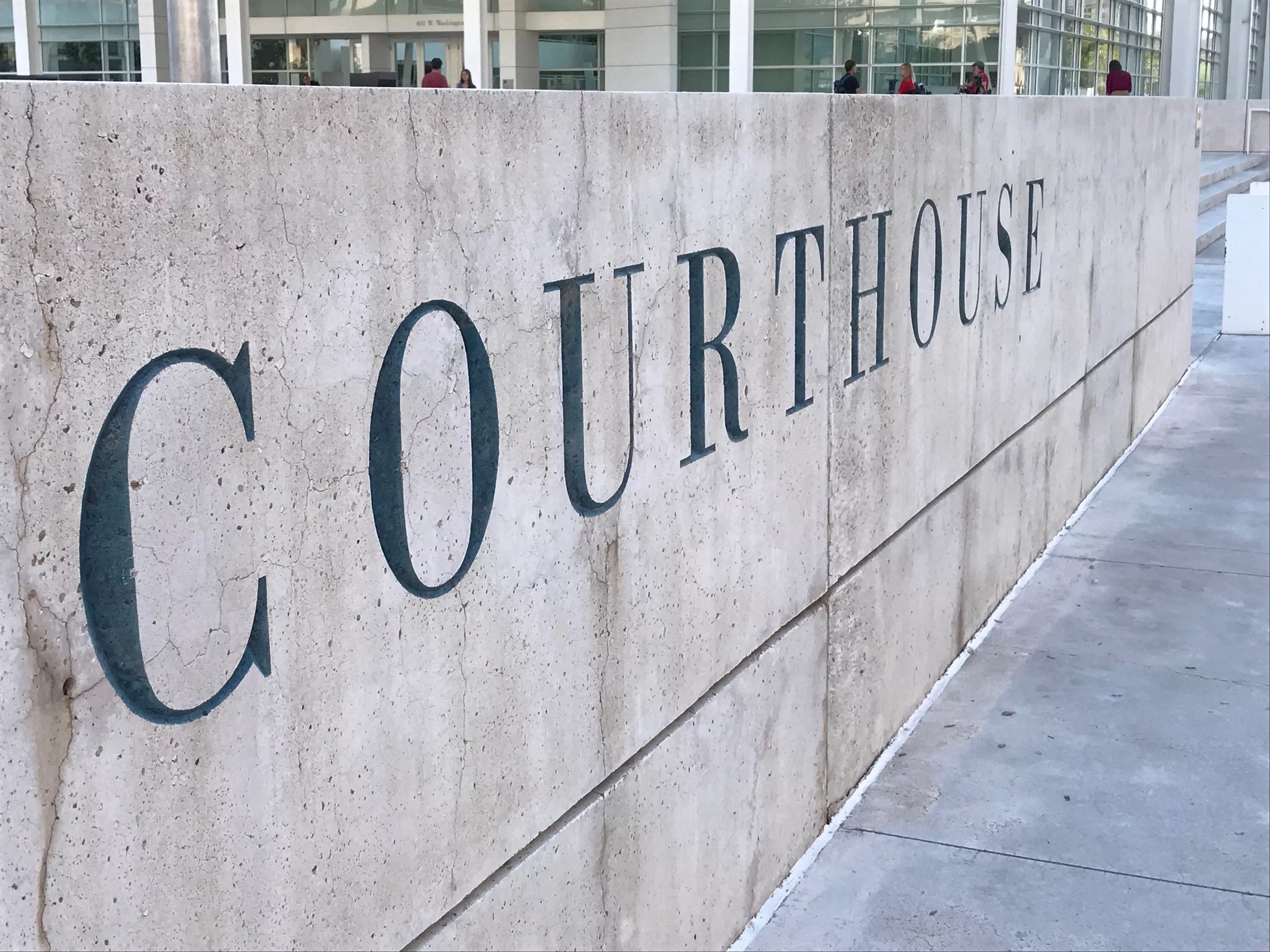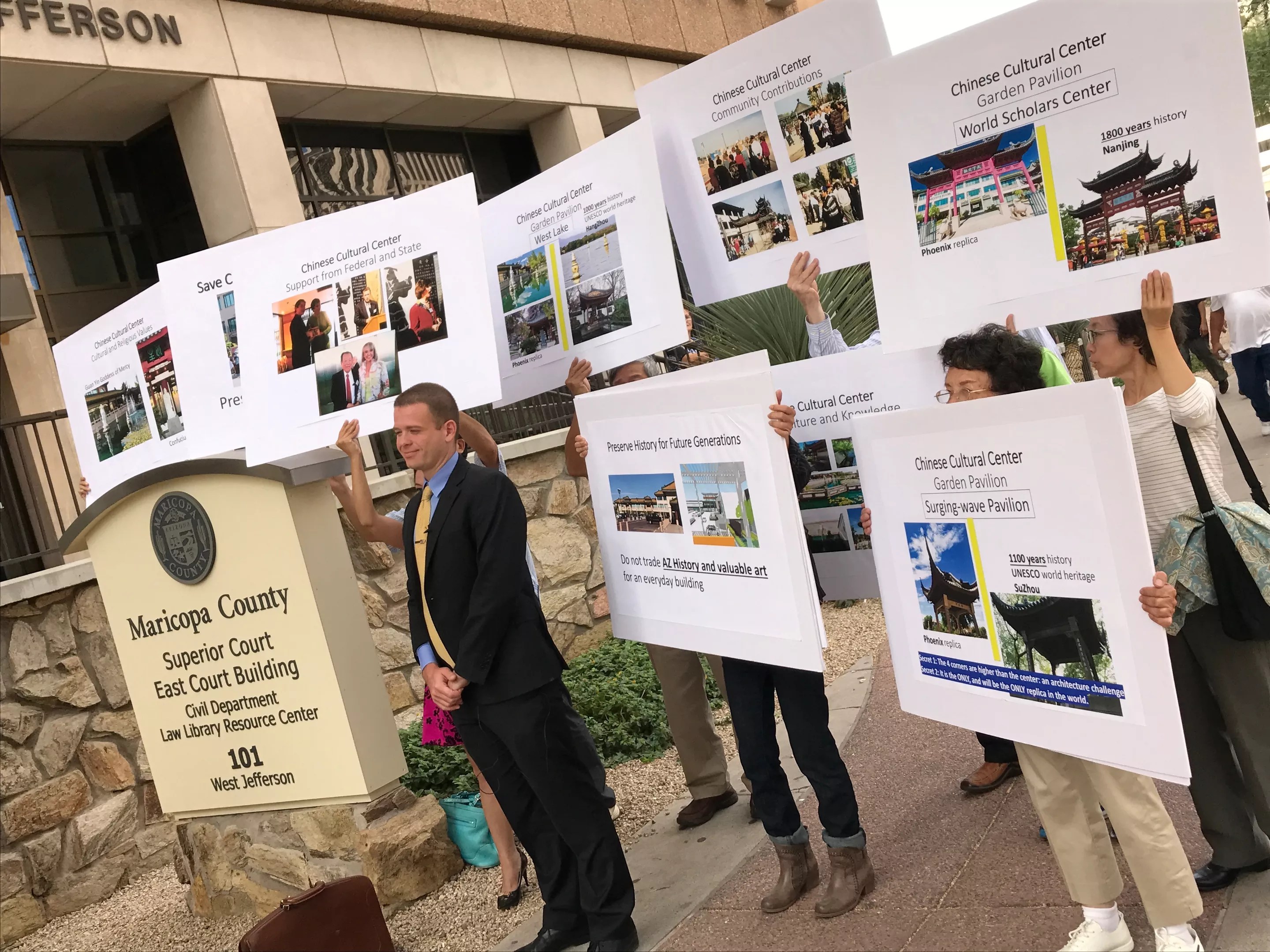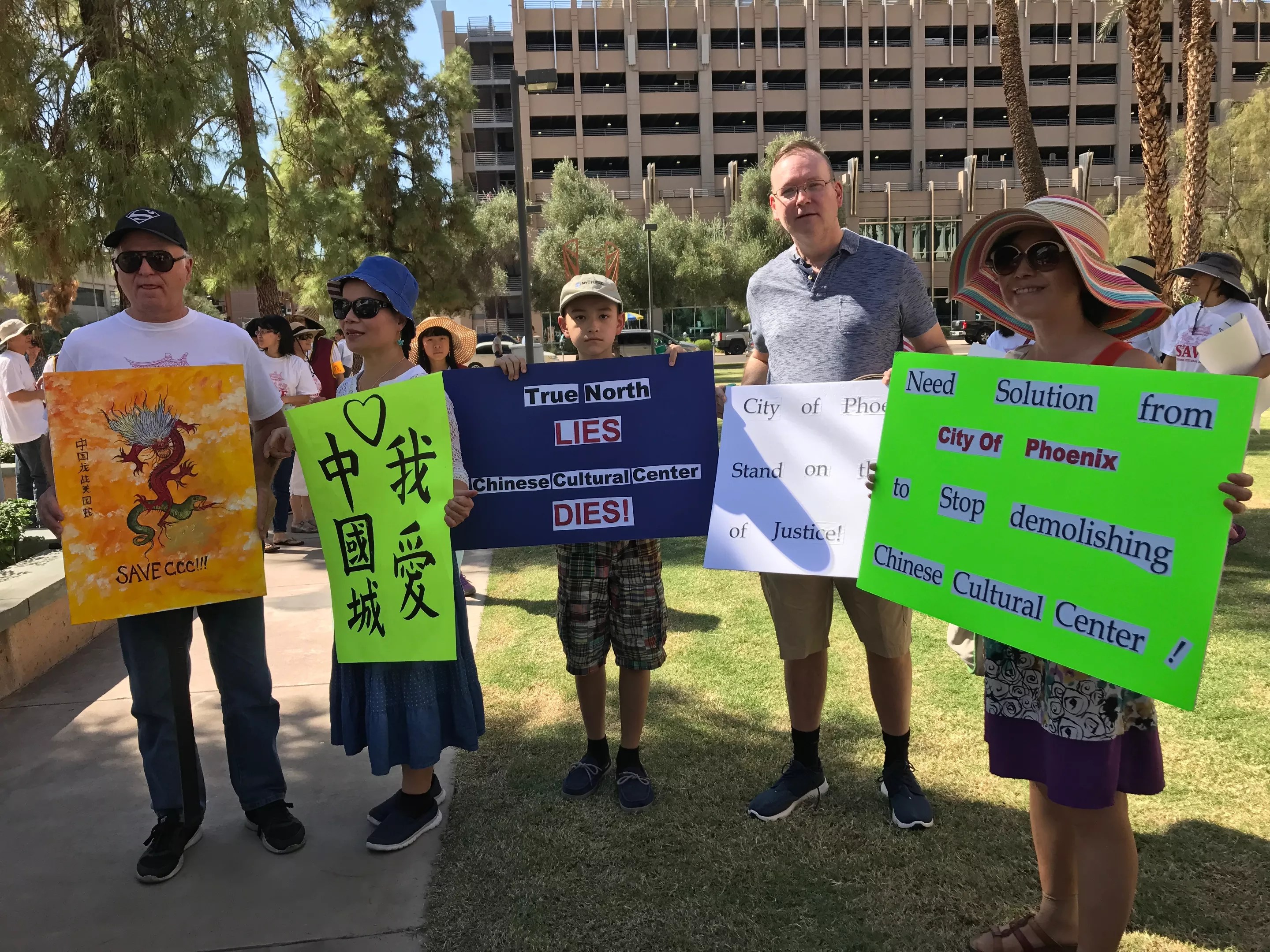
Lynn Trimble

Audio By Carbonatix
After a Scottsdale-based company bought the Chinese Cultural Center site in Phoenix, preservationists have pursued several actions designed to stop its redevelopment – including protests, an online petition, pleas to the Phoenix City Council, and legal action.
Although they’ve had some success, including getting a state court to issue a temporary restraining order preventing certain changes to the site, a recent case in federal court didn’t go their way.
On October 3 in the downtown courthouse for the U.S. District Court in Arizona, Judge Diane J. Humetewa denied preservationists’ request for a temporary restraining order, which was based on alleged violations of religious freedom and civil rights.
The federal lawsuit was filed by a nonprofit group representing local Chinese-Americans who want greater access to the site, located just north of Phoenix Sky Harbor International Airport.
The property, which includes several buildings and a garden, is owned by 668 North, a subsidiary of a Scottsdale-based private equity firm called True North.
Specifically, the group wants access to what it calls the prayer garden, which has been inaccessible since 668 North installed fencing around the building and garden perimeters in mid-September.
About 20 members of the Chinese-American community tried to pray inside the garden on September 21. But the gate was locked, so they prayed on the sidewalk along 44th Street that borders the garden.
Following that incident, the lawsuit was filed in an attempt to get that fence removed, and to stop other changes to the site.

Portion of the fencing installed by 688 North.
Lynn Trimble
The Chinese Cultural Center was built in 1997 at 44th Street near Van Buren Street, and served for many years as a mixed-use retail and business center.
Earlier this year, Scottsdale-based company 668 North purchased the 165,000-square-foot site for $10.5 million, and announced plans to transform it into corporate headquarters for its parent company, True North.
That caused controversy within the Valley’s Chinese-American community, which has mobilized in efforts to preserve the complex’s Chinese architecture and gardens.
And it’s led to several lawsuits, including one filed in the U.S. District Court in Arizona, and four filed in Maricopa County Superior Court.
On September 25, an organization called Arizona Foundation for Chinese Religious Rights, filed a federal lawsuit against 668 North, the True North subsidiary that owns the former Chinese Cultural Center. The foundation was established the same day the lawsuit was filed.
The foundation was created by Yu Min Shi, who says he’s been spending time at the Chinese Cultural Center for 20 years. He was part of the group that prayed along 44th Street on September 21. And he’s one of ten individuals who joined the non-profit in bringing the federal lawsuit.
The lawsuit alleges civil rights and religious freedom violations.
That’s because fencing installed around many of the complex’s buildings and its garden prevents people from entering the garden to pray.
The complex’s new owners say the fence is there for security purposes, and to protect passersby during construction at the site.
Supporters say the architecture of the Chinese Cultural Center, including a roof built with rare materials brought in from China, and installed by master artisans, has religious significance.
The lawsuit also names the city of Phoenix, because it granted a permit for 668 North to place the fencing around part of the property for six months.
City officials recently reviewed 668 North’s request for a permit to remove and replace the current roof, but ended up sending the request back to the company on Friday, October 6.
They approved the fencing, which is standard practice for a construction zone. Currently, 668 North is making changes to building interiors. That fencing permit expires after six months.
Materials that 668 North selected for the new roof didn’t meet the city’s zoning stipulations for the site, says Mo Glancy, assistant director for the development division that handles such requests.
But that’s only a temporary setback for 668 North. The company plans to refile its roofing permit soon, says Jason Rose, president of Rose + Moser + Allyn Public Relations. That’s the firm representing True North and its subsidiary.
The Arizona Foundation for Chinese Religious Rights asked the federal court to grant a temporary restraining order against 668 North, preventing the company from removing the current roof and requiring the removal of the fencing.
But Judge Humetewa denied the request for a temporary restraining order, after explaining that she appreciates the values, beliefs, and religious significance of the site to many community members.
The judge stated that concerns about the fence and possible roof changes were already being addressed in the lawsuit filed through the Maricopa County Superior Court.

Attorney Jack Wilenchik with Chinese Cultural Center supporters in downtown Phoenix.
Lynn Trimble
Now, the legal battle returns to the state courts.
On September 27, Superior Court Judge Randall H. Warner ruled in favor of Chinese Cultural Center supporters.
That lawsuit was filed by a company that does business as Szechwan Palace Restaurant, against True North, and its CEO David Tedesco, as well as Tedesco’s wife.
The judge granted a temporary restraining order, preventing 668 North from making changes to the site’s roof or gardens.
On November 3, Warner will begin hearing arguments for and against prohibiting 668 North changes to the Chinese Culture Center site.
And more legal battles are brewing.
L.B. Food Trading filed a lawsuit in Maricopa County Superior Court on Wednesday, October 4. They operate the Super L Ranch Market that relocated from the site to Scottsdale in September.
That lawsuit takes aim at 668 North, Jason Rose’s public relations firm, and Rose’s wife.
It alleges that the new owners and their public relations firm committed defamation and libel, by issuing press releases stating the Super L Ranch Market was having financial difficulties.
It also alleges that items belonging to the Super L Ranch Market were seized by the new owner, and have not been returned.
That’s just the latest twist in the controversy surrounding the former Chinese Cultural Center.
Back in August, Phoenix City Council got involved after Raymond Tang of Chandler submitted a petition asking the city to preserve the Chinese Cultural Center.
The City Council denied that request at its September 12 meeting, citing Arizona’s private property right laws.
But it also agreed to update a survey of Chinese culture and history in Phoenix, which might help advocates make the case for historical preservation.
The survey has yet to be initiated.
Phoenix attorney Paul Gilbert, who represented Chinese Cultural Center preservationists during that meeting, said his clients would pay for the survey.
But the city hasn’t received those funds, says Michelle Dodds, historic preservation officer for the City of Phoenix.
So efforts to save the Chinese Cultural Center through the formal historic preservation process have stalled. If the funds aren’t provided, the city won’t move forward with updating the survey, Dodds says.
Of course, that isn’t stopping advocates from pursuing other strategies.

Signs displayed at October 4 protest outside a Phoenix City Council meeting.
Lynn Trimble
On Wednesday, October 4, members of the Chinese-American community gathered outside the Phoenix City Council chambers to rally against changes to the Center. On Saturday, October 7, they protested in Tempe.
Hundreds of people attended the Phoenix event, according to organizers. Many wore T-shirts with the words “Preserve History.” Some displayed signs accusing True North and the city of Phoenix of trying to kill Chinese culture.
Meanwhile, 668 North officials have offered possible solutions, through a series of press releases.
On September 12, they issued a release detailing plans to preserve or relocated elements of the Chinese Cultural Center, such as a welcome gate and statues.
Two weeks later, they issued a release offering stipulations for anyone interested in buying the property. That move was suggested by Mayor Greg Stanton and Councilman Sal DiCiccio, according to the September 29 release.
Controversy is likely to continue, as various lawsuits work their way through the courts.
The federal ruling hasn’t deterred Shi from his position.
“This isn’t just a place with a market or restaurants,” Shi says of the site at the center of it all. “This is a place people go, sometimes daily, for individual prayer and meditation.”
Correction: This post originally stated that the Chinese Cultural Center was built in 2007. It was built in 1997.